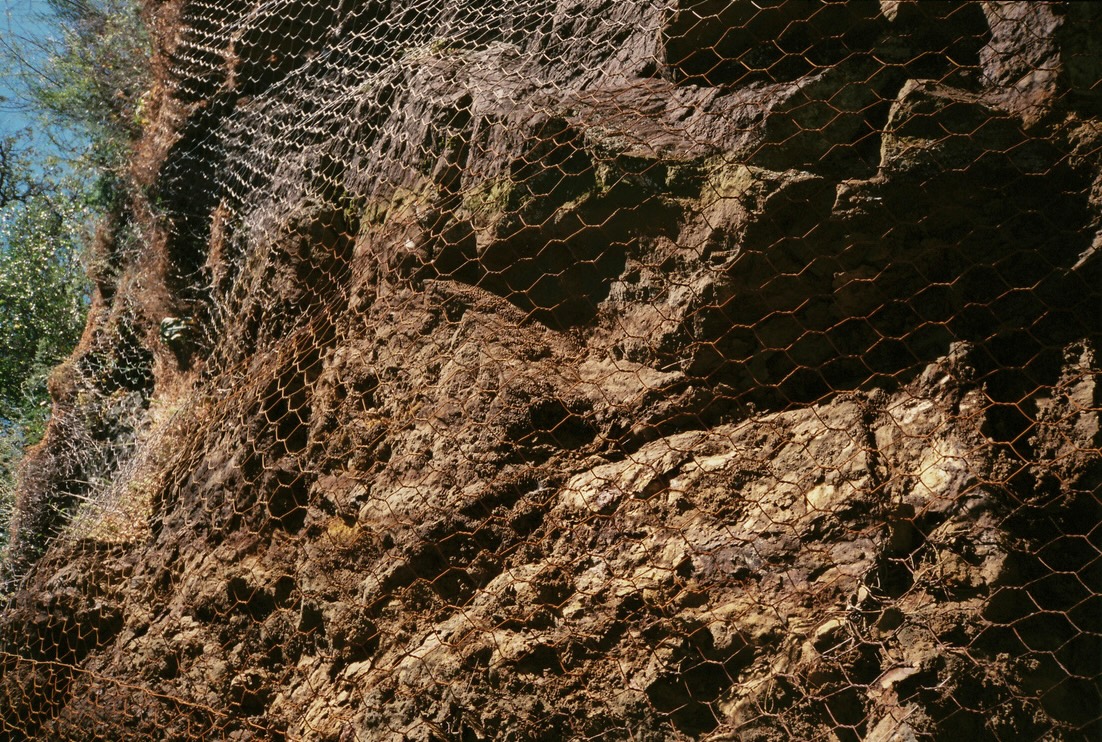Geoerotics

This weekend, I was lucky enough to take part in a performance and writing workshop, as part of the Alkantara festival in Lisbon. Geoerotics was centred between critical geology and meditations on queerness, run by performance artist and researcher Ritó (Rita Natálio).
The session involved group discussions on the history of mining in Portugal and South America. Like the UK, Portugal shares a long brutal colonial history that was predicated on extractive mining in overseas colonies, alongside the exploitation of working class mining communities domestically. Texts discussed included the ever-phenomenal A Billion Black Anthropocenes or None by Kathryn Yusoff, and Dyke (geology) by Sabrina Imbler, a book of personal essays than interpolates the history of geology with the author's own experience of coming out.
In preparation for the workshop, we were asked to find "an object/material that evokes the geological element", ideally a tactile object that can stimulate a sensual experience evocative of the erotic in an expanded non-normative sense, with the knowledge this would be shared around the group to be touched and held. I wanted to bring some mud - the really deep, viscous kind that envelops your feet in a tight, moist embrace, and steals your shoes. But it turns out mud is hard to find in the city, and harder than I expected to make in a hurry.
As an exercise, following the group discussions, we sat and reflected on the materiality of these objects, holding either our own or someone else's, before using this reflection as inspiration to write about geology, sexuality, identity and pleasure. I think I did this exercise a little wrong, but here, in an all-too-typical pseudo-philosophical style, is what I wrote:
To produce a rock requires a process of division, a fissure, requires that a portion of rock be cleft from the larger strata, cut out from the mother earth. This happens through stress, through pressure applied in duration, through the long rub of erosion, the ongoing exfoliation over time, as when the water slides over a geological surface and forms a groove, gradually wears through.
Subjectively, the twin inflections of the word rock each reference a substantive nature. The process of incision (whether through mining or weather-born erosion) isolates rock as singularity from rock as substance. Doing so creates: creates a rock as a unique object; creates the specificity needed to identify an individual from the background.
The partial is more closely observed than the whole, the individual more knowable than the crowd. Wholes are viewed holistically, it ways that often blurs their details, overlooking those complexities that trouble the whole's unification as whole, the unified wholeness. The specific can be studied, is communicable and computable, in exacting detail if desired.
An individual can be met, can be catalogued. The whole is not often so clear. It meaningful function is broader, more general, categorical. It is only when a shifting registers, when viewing whole strata in their individuality (rather than as collection), that we can assign individualised, unique properties.
This specificity of rock is in contradiction with the indivisibility of water, which so often acts to erode geological features. Water is conceived as a body: river, lake, puddle, pond, ocean, drop. We talk of water as continuity. As a fluid, it is a multitude, even in absence.
When we encounter ourselves, we often hope to find ourselves whole. I know I spend a lot of time trying to produce a narrative about myself that explains why I am how I am and who I am. But these narratives often fail to accommodate ourselves in multitude, with contradictions and competing tendencies, fluid and malleable.
We want to realise ourselves as subject, with agency, as capable. But there's a tension between ourselves as individuals and our presence within the continuity of the collective. This tensions is the so often the political foundation that neoliberalism exploits, through division and by diminishing collective struggle.
During the workshop, Natálio performed a short reading from one of their works. I felt the poem laid plain the absurdity of geology as property, the absurdity of owing rocks. The privatisation of common resources cannot begin from any truly fair ethical foundation, there is no legitimate authority to allow it in the first place: instead there is only violence. And yet owning land is the central absurdity of capitalism itself, and you can't own a mine unless you own land. Owning a mine is owning a lot of rocks, which central to the forms of extractive mining that drove colonial expansion.
In this mutation of earth into capital, we also encounter the second definition of the word "property": the properties of certain rocks (the specificity of their substance) is what gives them value as private property. Those properties define coal, from gold ore, from granite and marble. But our understanding of those properties come from geology as a field of study. Geology the functions as a way of viewing the world by its role as an epistemology, that produces the very knowledge of how to convert rocks into fuel or coinage, through exploitation of a racialised labour force.
Mining still drives politics, not least of all in Portugal, where a brewing corruption scandal over lithium mines has forced the resignation of the prime minister, António Costa. Lithium mining in Portugal has been hotly contested, with ongoing protests in the affected towns and regions. In Covas do Barroso, the mine has been green-lit to dig into land that is held in commons by the residents of the village, who continue to loudly vocalising their opposition. And so, the violence of enclosure continues.